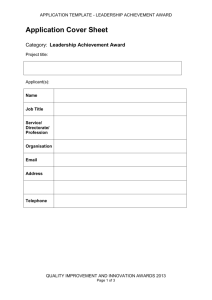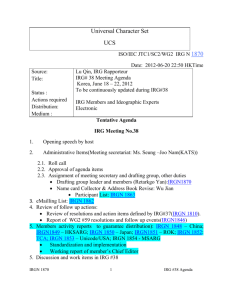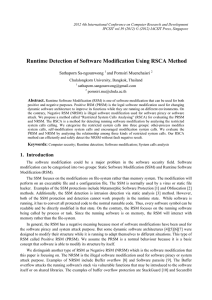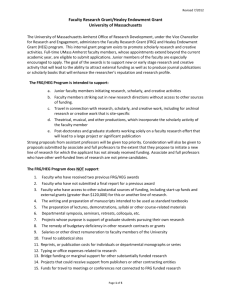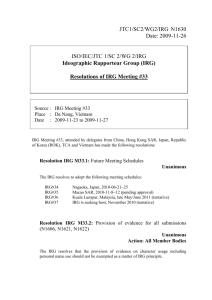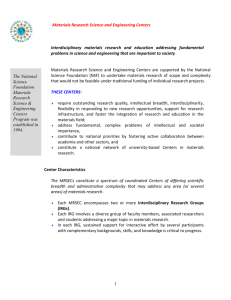California State University, Dominguez Hills
advertisement
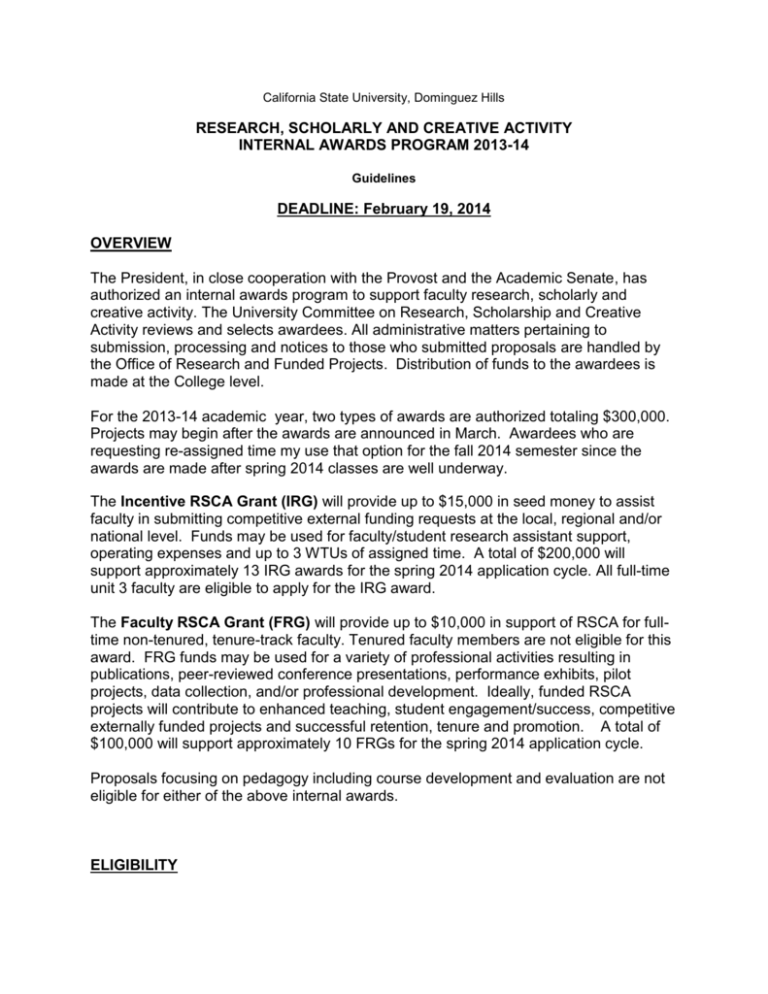
California State University, Dominguez Hills RESEARCH, SCHOLARLY AND CREATIVE ACTIVITY INTERNAL AWARDS PROGRAM 2013-14 Guidelines DEADLINE: February 19, 2014 OVERVIEW The President, in close cooperation with the Provost and the Academic Senate, has authorized an internal awards program to support faculty research, scholarly and creative activity. The University Committee on Research, Scholarship and Creative Activity reviews and selects awardees. All administrative matters pertaining to submission, processing and notices to those who submitted proposals are handled by the Office of Research and Funded Projects. Distribution of funds to the awardees is made at the College level. For the 2013-14 academic year, two types of awards are authorized totaling $300,000. Projects may begin after the awards are announced in March. Awardees who are requesting re-assigned time my use that option for the fall 2014 semester since the awards are made after spring 2014 classes are well underway. The Incentive RSCA Grant (IRG) will provide up to $15,000 in seed money to assist faculty in submitting competitive external funding requests at the local, regional and/or national level. Funds may be used for faculty/student research assistant support, operating expenses and up to 3 WTUs of assigned time. A total of $200,000 will support approximately 13 IRG awards for the spring 2014 application cycle. All full-time unit 3 faculty are eligible to apply for the IRG award. The Faculty RSCA Grant (FRG) will provide up to $10,000 in support of RSCA for fulltime non-tenured, tenure-track faculty. Tenured faculty members are not eligible for this award. FRG funds may be used for a variety of professional activities resulting in publications, peer-reviewed conference presentations, performance exhibits, pilot projects, data collection, and/or professional development. Ideally, funded RSCA projects will contribute to enhanced teaching, student engagement/success, competitive externally funded projects and successful retention, tenure and promotion. A total of $100,000 will support approximately 10 FRGs for the spring 2014 application cycle. Proposals focusing on pedagogy including course development and evaluation are not eligible for either of the above internal awards. ELIGIBILITY As stated above, all full-time unit 3 faculty are eligible to apply for the IRG award. Application for the FRG award is limited to full-time tenure track faculty members who have not received tenure and who do not have other assigned time support. PROPOSAL COMPONENTS A. Cover Sheet: (Located at http://www4.csudh.edu/orfp/internal-funding- opportunities/index This form must be completed and signed by the dean indicating authorization for assigned time (if requested) and administration of funds by the College ARM. The form may be scanned and sent to Craig Geber at cgeber@csudh.edu or included as page one of the total application proposal. B. Project Narrative Maximum of five (5) numbered pages, double-spaced, font size 11 or larger which should include: 1. Description of the problem or topic being addressed, including background information on development of the project; a. Objectives (Expected results or end products to be achieved during the project period); b. Methodology/Activities as appropriate to the discipline for accomplishing the objectives; c. Anticipated results 2. Dissemination and student impact. Describe to whom end products will be submitted or presented and student impact, directly or through course content). 3. External Funding Plan (for IRG applications only – omit this section for FRG applications). Describe plan to submit for external funding. Include both timing estimate and agencies/foundations to whom the proposal will be submitted. C. Biographical Sketch. Maximum two page vita that includes information and publications supporting the applicant’s qualifications in the area of the proposed project. D. Budget. One page with detailed entries as applicable for release time, student assistance, operating expenses and travel. Assigned time will be valued on standard replacement rate (ask college ARM for current rate) and requires approval of the College Dean. Because the members of the evaluation committee come from a variety of disciplines and backgrounds, proposals should be written with the non-specialist in mind. Applicants are also encouraged to share early drafts of proposals with colleagues. Additional proposal development assistance is available through the Office of Research and Funded Projects located in WH 445 (X 3756 for an appointment). OUTSTANDING FINAL REPORTS A copy of the final report for any previous internal RSCA awards should be on file. No new awards will be granted until final report/s from prior award/s is/are received. Do not append this report to the application. Submit any outstanding reports to Craig Geber at cgeber@csudh.edu. DEADLINE All materials must be submitted electronically to Craig Geber (cgeber@csudh.edu) in the Office of Research and Funded Projects by 5:00 P.M. on Wednesday, February 19, 2014. Incomplete or late applications will not be reviewed. EVALUATION Evaluation Criteria for Incentive RSCA Grant (IRG) Award Proposals: Explanation of value, merit and significance of your work and its potential contribution to your academic discipline (20 points) Goals and objectives of the study/activity are clear and attainable given the time constraints of the funding cycle (20 points) Anticipated outcome(s) of research/scholarly activity are clearly described including a dissemination plan and effect on students either directly or through course pedagogy (20 points). Clarity and organization of overall proposal including budget page (20 points) Likelihood that the project will lead to external support (20 points) Evaluation Criteria for Faculty RSCA Grant (FRG) Award Proposals: Explanation of value, merit and significance of your work and its potential contribution to your academic discipline (25 points) Goals and objectives of the study/activity are clear and attainable given the time constraints of the funding cycle (25 points) Anticipated outcome(s) of research/scholarly activity are clearly described including a dissemination plan and effect on students either directly or through course pedagogy (25 points). Clarity and organization of overall proposal including budget page (25 points) Evaluation Process: Evaluation will be accomplished by the RSCA Committee (PM-90-09) which includes elected tenured faculty members from the colleges and other University representatives detailed in the PM. The evaluation criteria and point value noted above will be used. The AVP for Research serves as an ex-officio, non-voting member and conveys funding recommendations from the Committee to the Provost and Vice President of Academic Affairs for final approval. ADMINSTRATION OF FUNDS Assigned time will be valued on standard replacement rate and requires approval of the College Dean via the signed proposal cover sheet. Expenditures must comply with University policy and procedures and will be administered by the College Academic Resource Manager. At the time the awards are announced, funds will be transferred to the respective Colleges of the awardees. Awardees should contact their College Academic Resource Manger regarding the expenditure of these funds. If the proposed activity entails human subject research, funds will not be released until institutional IRB approval is obtained. REPORTING Recipients of an internal RSCA award must submit a final report on the work accomplished and expenditures by December 1 of the award year. In addition, IRG recipients must submit an application for external funding related to the IRG grant activity no later than two years from the date of award. Failure to complete the final report or external funding request (if required) will disqualify the recipient from future internal award funding.



